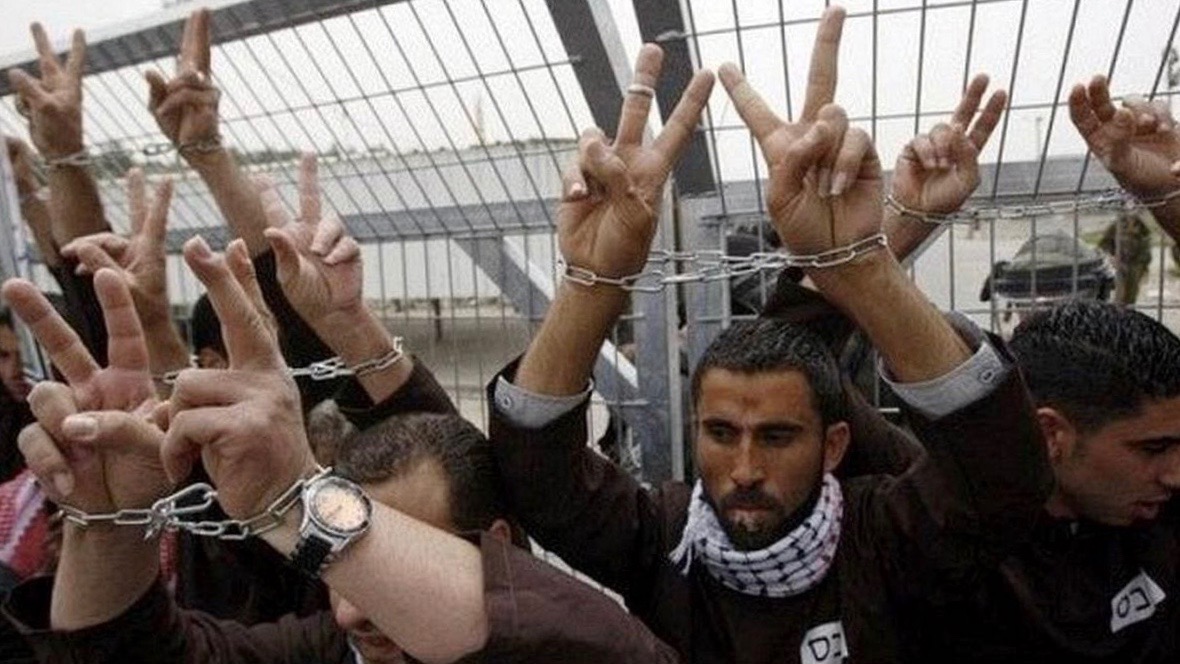As many as 1,380 Palestinian prisoners are set to launch a mass hunger strike on Friday, September 17, to protest Israeli brutality and repression of Palestinians being held in Israeli prisons and detention centers. This is comes amid the recent intensification of violent crackdowns and restrictions against Palestinian prisoners following the escape of six prisoners from the Gilboa prison on September 6.
All the different regulatory bodies of the various Palestinian factions in all prisons will be dissolved, effectively uniting all prisoners in resistance against the Israeli occupation. The prisoners have put forth a set of demands to the Israeli prison authorities and will continue their open-ended mass hunger strike under the banner of ‘the battle of defending the right’ until these are met. In the coming days, more prisoners are expected to join the hunger strike in batches.
According to the prisoners’ movement, of the 1,380 prisoners and detainees who will go on hunger strike from Friday, 400 are from Ramon prison, 300 from Ofer, 200 from Nafha, 200 from Megiddo, 100 from Gilboa, 80 from Eshel, 50 from Shatta, and 50 from Hadarim prison. More prisoners will join the strike in batches starting from September 21. Among those starting the strike on Friday, around 100 senior detainees, including popular Palestinian leader Marwan Barghouti, will also stop the intake of water as part of the strike.
The demands of the prisoners include an immediate end to Israeli repression and abuse of Palestinian prisoners, stopping arbitrary transfer of prisoners, reversing harsh penalties and restrictions imposed on hundreds of prisoners, bringing prisoners placed in solitary confinement or isolation to regular sections of the prison with the general prison population, and reinstating the detention conditions to what they were before September 5. Other demands are an end to the Israeli policy of administrative detention with unjustified extensions, allowing family visits, installing public telephones in prisons, and allowing prisoners to procure things they need, such as food and clothes.
Prisoners across Israeli prisons had already started resisting violent crackdowns by prison authorities following the daring escape of the six prisoners from Gilboa, with reports of clashes between prisoners and prison guards in Negev and Ramon prisons. Some prisoners also set fire to their prison cells in protest.
The prison movement has vowed a “gradual escalation” in their resistance against the Israeli authorities if the situation does not improve and their demands are not met. The Palestinian Detainees and Ex-Detainees Affairs Commission has called upon the international community, especially human rights and legal organizations, to “stop the policy of shame by remaining silent” and exert pressure on the Israeli government to stop its human rights violations against Palestinian prisoners, in accordance with international human rights law.
Meanwhile, four of the six escaped prisoners who were re-apprehended by the Israeli security forces were sent to extended remand for nine days by a court in Nazareth last week. They are facing various charges, including jailbreak, planning an armed attack, conspiring to escape the prison, and associating with a prohibited organization. Following their re-arrest, the prisoners were reportedly tortured. Subsequently, one of them, Zakaria Zubeidi, had to be transferred to hospital for medical treatment and is now reportedly in the ICU. The commission said that on Monday, an Israeli court rejected its petition to allow a lawyer to visit the four prisoners to check on their health and the conditions in which they are currently detained. However, the court later allowed the lawyer to meet two of the four prisoners, Mahmoud and Mohammad Arda.





